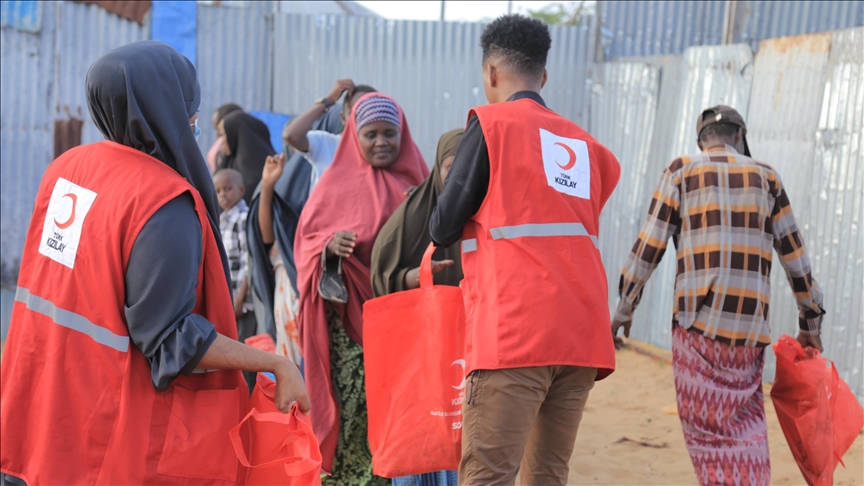- Merkel set for fourth term as chancellor as CDU leads parliamentary vote, exit polls say
- Turkey says it will send back ISIS prisoners even if citizenships revoked
- General Marchenko: ‘Mykolaiv was to be next city to fall, but Russia terribly failed’
- Ukrainian Armed Forces repel enemy attacks in four regions
- Somalia president hails lifting of arms embargo as government vows to wipe out al-Shabab militants
- Captured Somali pirates arrive in India to face trial over ship hijacking
- Martyred while serving nation: President Raisi dies in helicopter crash
- Stay Connected
Turkish generosity helping to reduce impact of drought in Somalia .Country facing its worst drought in 40 years
The Turkish Red Crescent (Kizilay) is helping ease the impact of a severe drought in parts of Somalia by distributing food aid and hot meals.
“We provide 3,195 hot meals daily from our soup kitchen in Mogadishu which are distributed to 20 different locations in the city,” Rusen Cetinkaya, head of the Turkish Red Crescent delegation in Somalia, told Anadolu Agency in a phone interview over the weekend.

JOHANNESBURG
Cetinkaya said some of the cooked meals are sent to internally displaced persons (IDPs) camps, schools, orphanages, hospitals, and prisons around the city.
Somalia has had several failed rainy seasons which have pushed the country into its worst drought in 40 years edging towards a famine.
Pastoralist communities have been forced to leave their homes in search of pasture and water.
“In the past, we have supported the people of Somalia in the fight against drought. And now we are ready to support them again and we are trying to get donations from the Turkish community and the international community,” Cetinkaya said.
He said that last year, they built a deep tube well in the Sool area of Somalia which is currently benefiting around 40,000 people.
Cetinkaya noted, however, that the drought has pushed a disturbingly high number of children out of school.
“An additional 1.1 million children are at risk of dropping out, with thousands of schools already lacking access to water.”
He said children are losing their homes, their education, and their right to grow up safe from harm.
Cetinkaya said incidents of malnutrition have been recorded, which he said contributes to the further spread of diseases such as malaria and diarrhea, which have a significant share in child mortality.
The Turkish Red crescent also gives cash handouts to assist families in distress.
Millions in need of urgent assistance
Somalia, which has undergone decades of conflict, is facing its worst drought in many years due to failed rainy seasons.
According to the United Nations Office for the Coordination of Humanitarian Affairs (OCHA), the number of people in need of humanitarian assistance and protection in Somalia has risen from 5.9 million in 2021 to 7.7 million in 2022.
“As of January 2022, Somalia is the most severely drought-affected country in the Horn of Africa, with about 4.3 million people affected, of whom 271,000 have been forced to leave their homes in search of water, food, and pasture,” the UN agency said on its website.
OCHA says Somalia has one of the highest numbers of IDPs in the world, estimated at 2.9 million people in 2022, of whom 2.2 million require urgent humanitarian assistance.
“In many parts of the country, conflict and insecurity have aggravated vulnerabilities and displacement, with nearly 900,000 people living in inaccessible areas due to the presence of non-state armed actors,” it said.
It added that another 2 million people live in areas that have high access constraints where principled humanitarian operations face serious challenges.
The UN agency said the combined impact of recurring stress factors and shocks has deepened poverty in the country.
“At least 71 percent of Somalis are living below the poverty line, especially in areas where humanitarian access remains a challenge. Preventable diseases such as acute watery diarrhea and measles are endemic amid severe water shortages, poor sanitation, especially in IDP settlements, and limitations in the healthcare system,” it added.
Kizilay offers capacity building
The Turkish Red Crescent has been offering vocational training courses like sewing, which is already benefiting 18 women at Central Mogadishu Prison.
“We also distribute stationery for school projects and also bring in shipments of school materials such as desks,” Cetinkaya said.
He said the Turkish Red Crescent also distributes food hampers during the Muslim holy month of Ramadan.
During the just concluded Muslim holiday of Eid al-Adha, Kizilay slaughtered 3,850 cattle and 8,750 goats which were distributed across Somalia.
Source:aa.com.tr/en/africa/turkish
All News
- Erdoğan unveils Turkey’s plan to build a spaceport in Somalia: report
- Israeli genocide in Gaza sees death toll cross grim 44,000 mark
- Lebanon’s housing sector crumbles, rental demand surges amid Israel-Hezbollah war
- Russia Fired Experimental Hypersonic Missile at Ukraine in Response to Western Long-Range Missiles – Putin
- ICC slaps Netanyahu, Gallant with arrest warrants for war crimes
- Donald Trump expected to consider recognizing Somaliland independence, former UK defense minister says
- US embassy in Kyiv shutters after ‘significant’ air attack threat By Tamsin Paternoster
- Opposition leader wins Somaliland presidential contest
- Israeli strikes rattle Beirut, as peace talks begin to take shape
- Zelenskyy says ‘missiles will speak for themselves’ as Biden OKs long-range use
- Home
- Merkel set for fourth term as chancellor as CDU leads parliamentary vote, exit polls say
- Turkey says it will send back ISIS prisoners even if citizenships revoked
- General Marchenko: ‘Mykolaiv was to be next city to fall, but Russia terribly failed’
- Ukrainian Armed Forces repel enemy attacks in four regions
- Somalia president hails lifting of arms embargo as government vows to wipe out al-Shabab militants
- Captured Somali pirates arrive in India to face trial over ship hijacking
- Martyred while serving nation: President Raisi dies in helicopter crash
- RSS
Contact@kasmaal.com